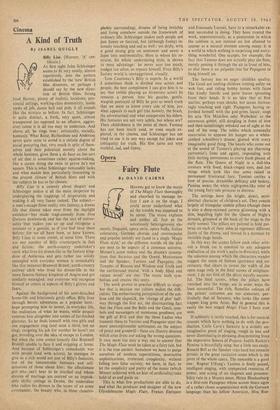Cinema
A Kind of Truth
By ISABEL QUIGLY
Billy Liar. (Warner; 'A' cer- tificate.) AT first sight John Schlesinger seems to fit very neatly, almost repetitively, into the pattern established by the 'new' British film directors, or perhaps I should say by the new direc- tion of British films. Strong local flavour, plenty of realistic locations, pro- vincial settings, working-class domesticity, inside views of job, dance hall and pub; it all sounds like the mixture as before. In fact, Schlesinger is quite distinct, a fresh, very quiet, almost transparent (as opposed to an effusive, aggres- sive) talent it is all too easy to underrate. And above all, he rings true: artistically, socially, humanly. What Reisz, Richardson and Anderson never quite seem to avoid is a certain degree of social posturing that, very much in spite of 'them- selves and their polemical anxiety about the whole business, gives them a de haut en bas sort of air that is sometimes rather squirm-making, like a curate doing the twist to prove he's not square. This is what Schlesinger noticeably lacks and what makes him particularly interesting in the present climate of British films and with the subjects he has so far chosen.
Billy"Liar '• it a comedy about despair and Schlesinger makes it all the more desperate by underplaying the trappings of desperation and making it all very funny indeed. The subject— a man's escape from reality into fantasy, a dream life that almost takes over from the daylight existence—has made tragi-comedy from Don Quixote downwards and has the sort of univer- sality that makes you sit up and recognise a moment or a gesture, as if you had been there before; for we all have been, or have known, Billy Liars to some extent, at some time. There are any number of Billy counterparts in fact and fiction: the north-country undertaker's
• clerk who lives his dream-life in the fantasy king- dom of Ambrosia and gets rather too solidly entangled with everyday women is remarkably like (for instance) Branwell Brontë, north-country railway clerk who lived his dream-life in the more famous fantasy kingdom of Angria and got similarly entangled; and everyone will recognise himself Or others in aspects of Billy's glories and fears.
Against the background of his semi-detached home-life and hilariously grisly office, Billy lives through heroic adventures as a popular hero: hope prompting him to invent, in everyday life, the realisation of what he wants, while despair removes him altogether into scenes of far-fetched glamour. So he finds himself with two girls and one engagement ring (and soon a third, but no ring), resigning his job for another he hasn't yet got, brooding over the idea of escape to London, but when the time comes (exactly like Branwell Brontë) unable to face it and stopping at home.
And because of Schlesinger's remarkable way with people (and with actors), he manages to give us a rich world not just of Billy's fantasies, but of the innumerable fantasies and self- delusions of those about him: the affectionate girl who can't bear to be touched and whose dreams of marriage are centred on an improb- ably idyllic cottage in Devon, the undertaker who radios his drivers in the terms of an army commander, the beauty who, in those claustro-
phobic surroundings, dreams of being invisible and living somehow outside the framework of ordinary life. Schlesinger makes such people not just funny or farcical, but (although funny) in- tensely touching and sad as well: yet dryly, with a good strong grip on sentiment and never a lapse into sentimentality. Here is where his re- straint, his whole understating style, is shown to most advantage: he never says too much, nudges too often, or repeats himself. Even Billy's fantasy world is unexaggerated, visually.
Tom Courtenay's Billy is superb. In a world I sometimes think is divided into actors and people, the best compliment I can give him is to say that (while playing an inveterate actor) he remains a person. Into his gauche, gentle, waspish portrayal of Billy he puts so much truth that we seem to know every side of him, just what appeals to each girl (the homely, the brash, the adventurous) and what exasperates his elders. His fantasies are not very subtle, but whose are? Their childishness is the point of them. Fantasy has not been much used, or even much ex- plored, in the cinema, and Schlesinger has not tried to use it in any way except for jokes and (obliquely) for truth. His film turns out very truthful, sad, and funny.






























 Previous page
Previous page